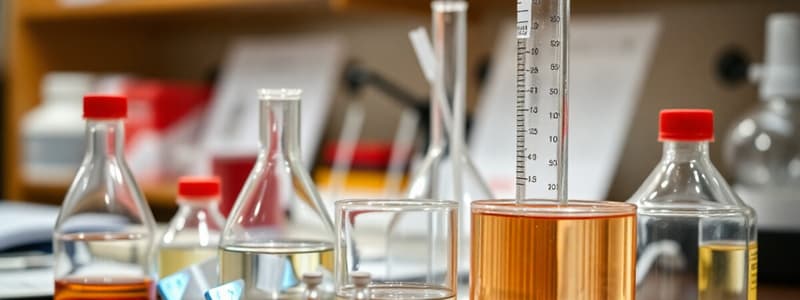Podcast
Questions and Answers
What is the purpose of a hypothesis in the scientific method?
What is the purpose of a hypothesis in the scientific method?
Which step in the scientific method involves the collection and evaluation of experimental results?
Which step in the scientific method involves the collection and evaluation of experimental results?
In which branch of science would one primarily study living organisms?
In which branch of science would one primarily study living organisms?
What characterizes scientific laws?
What characterizes scientific laws?
Signup and view all the answers
What is an iterative process in the context of the scientific method?
What is an iterative process in the context of the scientific method?
Signup and view all the answers
Which of the following is an example of a scientific theory?
Which of the following is an example of a scientific theory?
Signup and view all the answers
What is the first step of the scientific method?
What is the first step of the scientific method?
Signup and view all the answers
Which scientific branch studies Earth's structure and processes?
Which scientific branch studies Earth's structure and processes?
Signup and view all the answers
What does a prediction involve in the context of the scientific method?
What does a prediction involve in the context of the scientific method?
Signup and view all the answers
The overlap of methodologies among different branches of science indicates what?
The overlap of methodologies among different branches of science indicates what?
Signup and view all the answers
What is a characteristic feature of scientific theories?
What is a characteristic feature of scientific theories?
Signup and view all the answers
Which method is NOT commonly associated with scientific inquiry?
Which method is NOT commonly associated with scientific inquiry?
Signup and view all the answers
Why is communication important in the scientific community?
Why is communication important in the scientific community?
Signup and view all the answers
What aspect of scientific attitudes emphasizes the need for unbiased evaluation of evidence?
What aspect of scientific attitudes emphasizes the need for unbiased evaluation of evidence?
Signup and view all the answers
What is a critical implication of scientific advancements?
What is a critical implication of scientific advancements?
Signup and view all the answers
Which of the following reflects the limitation of science?
Which of the following reflects the limitation of science?
Signup and view all the answers
What is the role of peer-reviewed journals in the scientific process?
What is the role of peer-reviewed journals in the scientific process?
Signup and view all the answers
What attitude involves questioning claims and demanding evidence?
What attitude involves questioning claims and demanding evidence?
Signup and view all the answers
Which of the following best describes scientific integrity?
Which of the following best describes scientific integrity?
Signup and view all the answers
What motivates scientists to engage in inquiry?
What motivates scientists to engage in inquiry?
Signup and view all the answers
Study Notes
Scientific Method
- Science is a systematic approach to understanding the universe, building knowledge through testable explanations and predictions.
- The scientific method is a structured series of steps to investigate phenomena.
- Observation, hypothesis formation, experimentation, data analysis, and conclusion are crucial components.
- Observation involves carefully noting and recording a phenomenon.
- A question is formulated to define the problem of interest based on the observation.
- A hypothesis is a testable explanation, proposing a relationship between factors.
- A prediction anticipates outcomes if the hypothesis is correct.
- An experiment is a controlled test to confirm or reject the prediction.
- Data analysis assesses the experimental results, determining if they support the hypothesis.
- A conclusion summarizes the findings, evaluating the validity of the hypothesis.
- The scientific method is iterative, refining hypotheses and investigations through new data.
- Scientists publish findings to allow for peer review, ensuring accuracy and transparency.
Branches of Science
- Science is categorized into branches that focus on specific areas of study.
- Major branches include:
- Physics: Studies matter, energy, and their interactions through mechanics, electromagnetism, thermodynamics, and atomic physics.
- Chemistry: Explores matter's composition, structure, properties, and reactions.
- Biology: Investigates living organisms and their interactions.
- Other key branches include:
- Geology: Studies Earth's structure, processes, and history.
- Astronomy: Observes celestial objects and phenomena.
- Ecology: Examines interactions between organisms and their environment.
- Overlapping methodologies and principles connect the various scientific branches.
Scientific Laws and Theories
- Scientific laws are descriptions of relationships in nature, often expressed mathematically, that have been universally observed with no contradictory evidence.
- Scientific theories are comprehensive explanations of phenomena supported by extensive and consistent evidence.
- Theories are not mere guesses but provide frameworks for understanding observations and experimental results.
- Theories can be refined or revised based on new evidence but are rarely completely rejected unless a more encompassing theory is developed.
Scientific Inquiry
- Scientific inquiry includes a variety of methods used to study the natural world.
- Common methods involve observation, experimentation, modeling, and data analysis.
- Scientists use tools to enhance measurements, observations, and investigation detail.
- Sharing findings and obtaining feedback from other scientists is crucial.
- Peer-reviewed publications are key to ensuring the credibility and validity of scientific discoveries.
Scientific Attitudes
- Objectivity, skepticism, curiosity, and honesty are crucial scientific attitudes.
- Objectivity maintains a neutral perspective during evidence evaluation.
- Skepticism questions claims and demands supporting evidence.
- Curiosity explores the unknown to understand natural phenomena.
- Honesty ensures accurate and transparent reporting of findings.
- Maintaining scientific integrity promotes reproducibility and trust.
Implications of Science
- Science has wide-ranging applications in various aspects of life.
- Scientific advancements lead to innovations in technology, medicine, and agriculture, improving quality of life.
- Science tackles problems and enhances societal well-being.
- Understanding phenomena like climate change, ecosystems, and human health necessitates scientific investigation.
Limitations of Science
- Science does not address all aspects of human experience.
- Focusing on the natural world, science cannot answer questions of faith, values, or morality.
- Scientific understanding is dynamic, evolving based on available data and new discoveries.
Studying That Suits You
Use AI to generate personalized quizzes and flashcards to suit your learning preferences.
Description
This quiz explores the key components of the scientific method and the systematic steps involved in scientific investigation. From observation to drawing conclusions, test your knowledge of this essential process used to investigate phenomena. Perfect for students wanting to grasp the basics of scientific inquiry.




